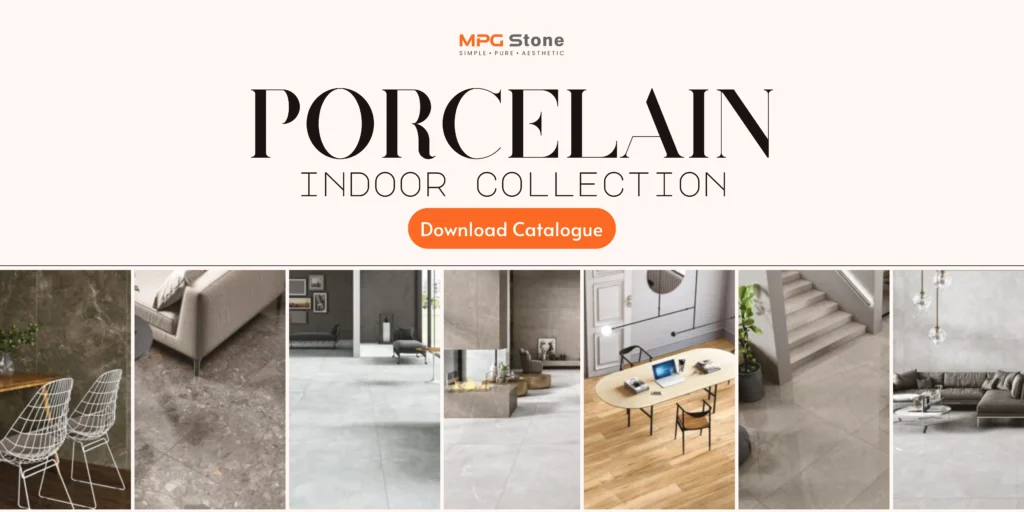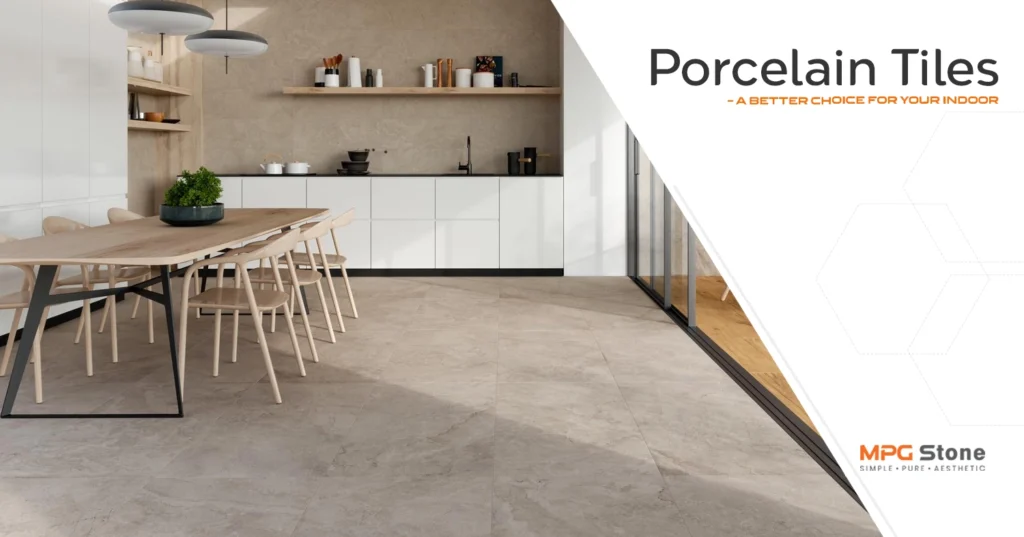Designing and renovating your indoor space can be an exciting thing to do. But it comes with some challenging tasks to choose the best possible products. You might be thinking of porcelain indoor tiles to enhance your space. In this blog, we are going to discuss everything about porcelain tiles, including their advantages, types, and differences.
What Is A Porcelain Tile?
Porcelain tile is a ceramic tile made with a mixture of dense natural clay. It is pressed into a desired shape at a very high temperature to eradicate all the moisture it has. These tiles have a water absorption rate of even less than 0.5%.
What Are The Advantages Of Indoor Porcelain Tiles?
Extra-large-formatted Porcelain Tiles have taken the remodeling industry by storm as they are now able to provide a plethora of benefits. It has come a long way as one of the most durable tiles. Let’s take a look at its unique benefits.
Adaptable
Porcelain is an easy-to-adapt stone that can be matched with any type of decor or architectural structure. It can easily be paired with a modern, contemporary, traditional, or any other kind of setting. It easily eliminates concerns related to flooring options.
Low Maintenance
Indoor Porcelain tiles are one of the best choices for those looking forward to having a shining and clean floor without doing much. Spills on the surface of porcelain tiles can be easily wiped away with the help of a damp cloth and gentle detergents. In the case of any defect or break, necessary repairs are also not that much more expensive.
Great Color Finishes
One of the most astonishing qualities of porcelain is that it can be made in any color and has a printed surface that mostly resembles other natural stone tiles. Whatever your requirement, whether it is a limestone tiles finish or marble look, you can use porcelain.
Durable Flooring
Porcelain tiles and slabs are considered one of the best options for kitchens, bathrooms, and other indoor house spaces. They can easily prevent the swelling or rot that emerges from exposure to moisture in different environments.
Wear And tear-resistant
Porcelain tiles win as the perfect choice for indoor spaces as they combat the majority of heavy impact stresses. It also has a PEI rating of 5 and is robust enough to oppose any environmental change.
Liquid And stain-resistant
Porcelain tiles are claimed to be one of the most impermeable flooring surfaces, having the ability to prevent water penetration to an extent unmatched by any other material. With porcelain tiles, it is assured that not even the smallest particle can go through your flooring.
Fireproof
Porcelain is one of the strongest materials against fire. Even extremely high temperatures can’t melt or burn porcelain easily. In case of a fire breaking out in any residential space, you can be assured of your possessions due to indoor porcelain tiles and slabs.
Options
In addition to their practicality, porcelain tiles also offer aesthetic benefits. In Porcelain slabs, there are almost endless options to choose from for the interior of a home, whether it is a granite-look tile or a marble slabs one. Porcelain tiles provide the perfect imitation of all the stones and cost less than the actual stones.
What Are The Disadvantages Of Indoor Porcelain Tiles?
Along with such great benefits, some issues come up with porcelain flooring that you should be aware of, which include:
Difficult Installation
Porcelain tiles are denser, which makes them difficult to install; you need to have professionals along for the installation, and it is also not easy to cut these tiles.
Heavy Weighted
Porcelain tiles are quite heavy, and for this reason, you need to have a stronger base that can handle the extra weight of these tiles. And this makes it hard during installation too.
What Types Of finishes Are Available In Indoor Porcelain Tiles?
Indoor porcelain tiles have four types of finishes available, which are:
Polished Porcelain Tiles
Polished Porcelain tiles are made by polishing the tile’s surface using a diamond disk. This tile has a shiny gloss and a smooth finish.
Features Of Polished Porcelain Tiles:
- They provide a luxurious feel to any residential or commercial space.
- They can be used in dining rooms, bedrooms, and living rooms.
- They are slippery, which makes them less suitable for use in wet areas.
- You can use them to provide a sophisticated look to your indoor area.
Unpolished Porcelain Tiles
Unpolished porcelain tiles are also known as honed or matte-finished tiles. They are made by grinding the surface with fewer abrasive grits.
Features Of Unpolished Porcelain Tiles:
- They have a rustic appearance that is less reflective and provides a natural feel.
- They are less slippery and provide a relatively better grip.
Glazed Porcelain Tiles
Glazed porcelain tiles have a glazed surface coated with a layer of glass. These tiles are available in a glossy and matte finishes in both colored and clear looks.
Features Of Glazed Porcelain Tiles:
- These tiles are easy to clean and can be used in kitchens and bathrooms.
- These tiles are also water-resistant, which makes them a popular choice for moisture-prone areas.
- They also come in a variety of colors and designs to choose from.
Unglazed Porcelain Tiles
Unglazed porcelain tiles don’t have a glass coating and are porous. They have a textured and more natural appearance than other porcelain tiles, which makes them ideal for use in outdoor areas.
Features Of Unglazed Porcelain Tiles:
- They are the ideal choice to use in high-traffic areas as they are more resistant to normal wear and tear.
- These tiles require more maintenance as they are more prone to stains.

What Is The Difference Between Hardwood Look Porcelain Tile And Hardwood Flooring?
While looking for a flooring option for indoor spaces, many have to go through different types, but some of the major differences are whether to choose hardwood flooring or hardwood that looks like porcelain flooring. And here is the answer on a different basis:
Maintenance
There is always a possibility of visible scratches and dents on hardwood flooring, while porcelain flooring is resistant to both scratches and dents. And it is easier to clean and maintain a tile due to its durable nature.
Water Resistance
Hardwood flooring is a natural material that absorbs moisture and other liquids, which can be a limitation for a longer period of time. While porcelain flooring is tile, it is resistant to water and other liquids, which will benefit you in the long run.
Style And Design Options
Since Hardwood is a natural material, it is still available in various designs but has limitations of its own. On the other hand, porcelain is a man-made tile that has no limitations in terms of options and can be available in several designs, styles, and shapes.
Conclusion
Indoor Porcelain Tiles are considered one of the best tiles to meet all our indoor needs. You can match them with other things in your space with their wide range of styles and designs. If you are considering buying porcelain tiles for your next project, then MPG Stone is a must-go for you.
We are one of the largest manufacturers and suppliers of porcelain tiles. You can choose from our range of porcelain tiles in the Explore section.
And tell us what you think about using porcelain tiles for the indoor area. Comment below.






